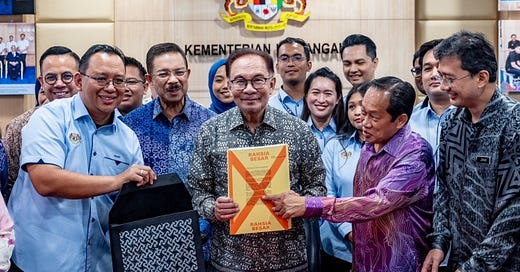A more of the same budget by the Madani government
Change of government but policies the same
Last Friday 13th October, the prime minister and finance minister Anwar Ibrahim delivered his 3rd budget (mini and 2023 budget beforehand) in the first year of his administration.
With RM 393 billion in spending a record will go into the Malaysian Book of Records for the largest budget ever. With a budget deficit of RM 86 billion, government debt is going above the RM 1.5 trillion mark. Debt service costs are RM 49.8 billion or 12.6 percent of aggregate government spending. This may pressure an increase in money supply, which could be inflationary.
There could be a large tax collection shortfall in 2024
Tax revenue is estimated to be RM 244 billion, while non-tax revenue is estimated at RM 64 billion, primarily from GLC dividends. The budget papers optimistically forecast growth at 4-5 percent. However, if there is any further economic slowdown, tax and dividend receipt estimates will not be achieved.
In terms of broadening the tax base, little has been announced, except for a 10 percent capital gains tax, and a ‘token’ tax on luxury goods such as watches and jewellery. The real difficult decisions have been delayed.
Most of the spending appears to a simple extension of what has been done by previous governments. SME development, flood mitigation, developing food security, and welfare are just the same what previous government have done. Of course, this government has its own specific issues, which it has thrown spending at.
Civil servants will receive and RM 2,000 incentive, and an increase in pension payouts, which alarmingly make up RM 32.4 billion or 8.2 percent of government expenditure.
There is no effort to rein in public sector expenditure, thus throwing any hopes to increase productivity to the wind. Continued public sector inefficiencies will continue, and a question as to whether the civil service will be able to effectively implement government plans as set out in the budget.
In regards to the ‘green platform’, there needs to be a real serious and rational discussion about the benefits of carbon capture, rather than blindly following WEF ideas. The rush to expand on the use of solar panels as a source of energy, should examine the Thai disappointment of their solar initiatives, implements almost a decade ago. Most of them are now unusable due to disrepair.
The acquisition of 50 electric buses and changing the government fleet of EVs by the government should closely examine the practicalities of this. In addition, why does Malaysia feel the need to import these EVs, when they could be build locally in Malaysia, with indigenous technologies?
Crondani economics
The plan to use public funds to widen the North-South Highway (PLUS) between Sedenak and Simpang Reggan is nothing more than a transfer of nearly RM 1.0 billion to a GLC Khazanah. If public funds are being used to expand the PLUS infrastructure, why do Malaysians continue to pay tolls?
In addition, the funding of PNB to purchase prime public lands from government is just a continuation of the massive landgraps that have been going on under the Madani administration by GLCs and crony companies alike.
Putting RM 1.5 billion into the hands of GLCs, outside the control of government, to assist SME start-ups just strengthens the economic power of these companies.
One massive red light is that so much expenditure is going into just maintaining national public infrastructure, showing up the current disrepair infrastructure exists today. This includes RM 2.8 billion to repair public roads, and RM 150 million to repair the nation’s public toilets. Why has such infrastructure been allowed to fall into so much disrepair in the first place?
This latest budget just shows there can be changes in government, but policies will just be the same.
We will see many more groups come out in criticism of this budget in the coming days as the detail seeps in. Its going to need a big sell.
Subscribe Below:





Same old bodge it, this time by the just as useless Mad Annie gomen...
Chinese pay 90% of the income tax collected. And they are only 25% of the population. Why are Malays contributing so little to the tax collection? Is it because they are Ketuanan? And they receive the most of the handouts. Also Ketuanan? This country cannot carry on with this system. Something will have to give.